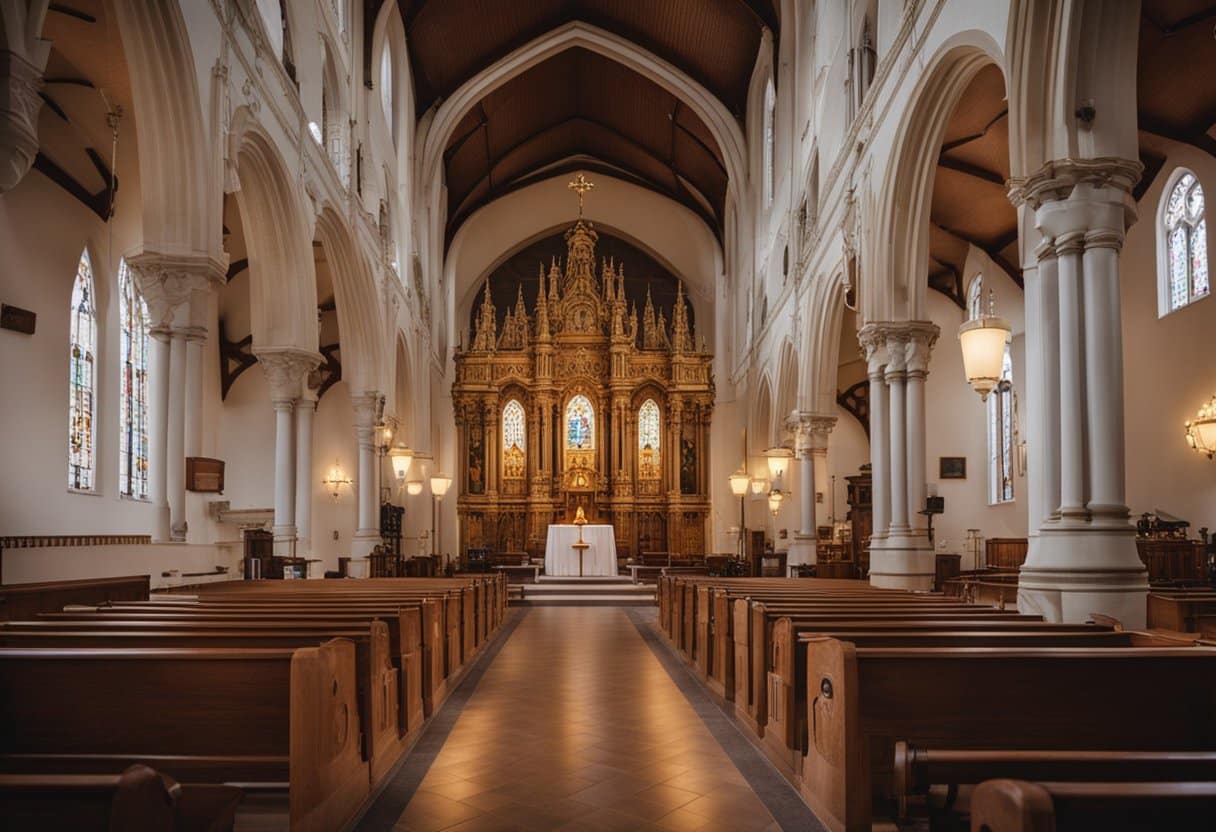If you’ve ever wondered whether Jesus went to church, the answer is yes.
The Bible tells us that Jesus regularly attended synagogue, which was the equivalent of the church in the Old Testament.
In fact, Luke 4:16 states that Jesus went to the synagogue on the Sabbath day, as was his custom.
This tells us that Jesus not only attended church but that he also valued the importance of worship and community.

Jesus’s attendance at synagogue wasn’t just a matter of tradition, however. He also used these gatherings as an opportunity to teach and share his message with others.
In Luke 4:17-21, we see Jesus reading from the scroll of Isaiah and proclaiming that he was sent to preach good news to the poor, proclaim freedom for prisoners, and give sight to the blind.
This demonstrates that Jesus saw the synagogue as a place to spread his teachings and connect with others who were seeking spiritual guidance.
Jesus and the Synagogue
As a devout Jew, Jesus regularly attended the synagogue in Nazareth, where he had been brought up.
The synagogue was the center of Jewish religious life, and it was customary for Jews to attend services on the Sabbath.
Jesus not only attended the synagogue, but he also participated in its services, reading from the Torah and teaching the congregation.
Custom of Reading and Teaching
One of the central practices of the synagogue was the public reading of the Torah. The Torah was divided into weekly portions, and each Sabbath a portion was read aloud in the synagogue.
After the reading, a member of the congregation would give a sermon, or “drash,” on the portion.
Jesus was known to have read from the Torah and given sermons in the synagogue, demonstrating his knowledge of Jewish scripture and tradition.
Jesus as a Rabbi
Jesus was also recognized as a rabbi, or teacher, in the synagogue. As a rabbi, he had the authority to interpret Jewish law and teach its meaning to others.
His teachings often challenged the traditional interpretations of the law and emphasized the importance of love, compassion, and forgiveness.
In summary, Jesus regularly attended the synagogue in Nazareth, where he participated in the reading and teaching of the Torah.
As a recognized rabbi, he had the authority to interpret Jewish law and teach its meaning to others.
His teachings emphasized the importance of love, compassion, and forgiveness, challenging traditional interpretations of the law.
Jesus’s Teachings and Actions

Jesus’s teachings and actions were central to his ministry. He traveled throughout the region, healing the sick and preaching to the people.
His teachings focused on love, forgiveness, and repentance.
Healing Miracles
Jesus performed many healing miracles during his ministry. He healed the blind, the lame, the deaf, and the sick.
He even raised the dead. These miracles were a sign of his divine power and helped to spread his message of love and compassion.
Sermons and Parables
Jesus’s teachings were often delivered through sermons and parables. He used these stories to illustrate important lessons about love, forgiveness, and repentance.
His most famous sermon is the Sermon on the Mount, which includes the Beatitudes and other teachings about how to live a good life.
Jesus’s teachings and actions inspired many people to follow him. He had a group of disciples who traveled with him and learned from him.
He also had many followers who listened to his teachings and tried to live according to his message of love and compassion.
In conclusion, Jesus’s teachings and actions were central to his ministry.
He healed the sick, preached about love and forgiveness, and inspired many people to follow him. His message of love and compassion continues to inspire people today.
Role of the Temple in Jesus’s Life

The Temple in Jerusalem was a central location in the life of Jesus.
As a devout Jew, he would have made regular visits to the Temple to worship and observe Jewish traditions. The Temple was also the site of many important events in Jesus’s life.
Jesus in the Jerusalem Temple
Jesus’s first recorded visit to the Temple was when he was just a baby, brought there by his parents to be presented to the Lord.
As he grew older, he continued to visit the Temple regularly. At the age of 12, he traveled to Jerusalem with his parents for the Passover festival and was found teaching in the Temple.
The Temple was also the site of many of Jesus’s teachings and miracles.
He frequently used the Temple as a backdrop for his parables and teachings, and he healed many people in the Temple courts.
Passover and Crucifixion
The Temple was particularly significant in the events leading up to Jesus’s crucifixion.
The Last Supper, which Jesus shared with his disciples before his arrest, was a Passover meal held in Jerusalem. Jesus was later tried and sentenced to death by the Jewish authorities, who held their meetings in the Temple.
The crucifixion itself took place outside the walls of Jerusalem, but the events leading up to it and the aftermath were centered on the Temple.
Jesus was arrested in the Garden of Gethsemane, which was located on the Mount of Olives, just east of the Temple.
After his death and resurrection, his followers continued to meet in the Temple courts to pray and worship.
In conclusion, the Temple played a vital role in the life of Jesus. It was the center of Jewish worship and tradition, and it was the site of many of Jesus’s teachings and miracles.
The events leading up to his crucifixion and resurrection were also closely tied to the Temple and its surroundings.
Jesus and the Early Christian Church

As the founder of Christianity, Jesus played a central role in the formation of the early Christian Church.
Despite not attending church in the traditional sense, his teachings and actions served as the foundation for the beliefs and practices of early Christians.
Apostles and Early Christians
After Jesus’ death and resurrection, his apostles continued to spread his message and establish communities of believers.
These early Christians met in homes and other private settings, rather than in formal church buildings.
The apostle Paul played a particularly significant role in the growth and organization of the early Church, writing numerous letters to these communities and helping to establish new ones.
Persecution and Spread of Christianity
Despite the efforts of the apostles and early Christians, the spread of Christianity was met with significant opposition and persecution from the Roman Empire.
However, this persecution only served to strengthen the resolve of believers, and the Church continued to grow and spread throughout the empire.
Eventually, the emperor Constantine converted to Christianity, leading to its widespread acceptance and establishment as the official religion of the Roman Empire.
Overall, while Jesus did not attend church in the traditional sense, his teachings and actions served as the foundation for the beliefs and practices of early Christians.
Through the efforts of the apostles and early Christians, and despite significant opposition and persecution, Christianity continued to spread and grow throughout the Roman Empire.
Theological Perspectives
When it comes to the question of whether Jesus went to church or not, different theological perspectives offer varying insights.
Two theological perspectives that shed light on this topic are Incarnation and Christology and Jesus as the Messiah.
Incarnation and Christology
Incarnation refers to the belief that Jesus is the Son of God who became a human being. This theological perspective emphasizes the idea that Jesus was fully divine and fully human.
Christology, on the other hand, is the study of the nature and person of Jesus Christ. It explores questions like who Jesus was, what he did, and what his role is in salvation.
From an Incarnation and Christology perspective, it is reasonable to assume that Jesus went to synagogue, which is the Old Testament equivalent of church.
This is because Jesus was a devout Jew who followed the Jewish customs and traditions.
Moreover, in the Gospel of St Luke, it is mentioned that Jesus went to Nazareth, where he had been brought up, and as was his custom, he entered the synagogue on the Sabbath day and stood up to read.
Jesus as the Messiah
Another theological perspective that sheds light on this topic is Jesus as the Messiah.
The term “Messiah” means “anointed one” and refers to the belief that Jesus was the chosen one of God who was sent to save humanity from sin and death.
From a Jesus as the Messiah perspective, it is reasonable to assume that Jesus went to synagogue because he was fulfilling the prophecy of the Messiah.
In the Gospel of St Matthew, it is mentioned that Jesus went throughout Galilee, teaching in their synagogues, proclaiming the good news of the kingdom, and healing every disease and sickness among the people.
In conclusion, from both Incarnation and Christology and Jesus as the Messiah perspectives, it is reasonable to assume that Jesus went to synagogue, which is the Old Testament equivalent of church.
This is because Jesus was a devout Jew who followed Jewish customs and traditions, and he was fulfilling the prophecy of the Messiah.
Modern Interpretation and Practice
Church Attendance Today
In modern times, attending church is still a highly valued practice for many believers. It is seen as a way to connect with God and other members of the Christian community.
Church attendance can vary from weekly to monthly, depending on personal beliefs and schedules. Some churches also offer online services for those who are unable to attend in person.
Role of Pastors and Leaders
Pastors and leaders play an important role in modern church practice. They are responsible for leading the congregation in worship, delivering sermons, and providing guidance and support to members of the community.
They may also be involved in organizing events and programs to promote unity and strengthen the faith of believers.
It is important for pastors and leaders to have a strong understanding of the Bible and its teachings, as well as the needs and concerns of their congregation.
They should strive to create a welcoming and inclusive environment where all members feel valued and supported.
Overall, modern church practice emphasizes the importance of community and unity in the faith.
Believers are encouraged to attend church regularly, participate in events and programs, and seek guidance and support from their pastors and leaders.
Family members are also encouraged to attend together, strengthening their bond and faith as a unit.
Frequently Asked Questions
What church did Jesus belong to?
Jesus was a Jew, and his religion was Judaism. He was born into a Jewish family and was circumcised on the eighth day, according to Jewish custom.
Jesus’ teachings were rooted in Jewish scripture and tradition.
Did Jesus worship in a church?
Jesus did not worship in a church, as we know it today. Instead, he worshiped in synagogues, which were the Jewish equivalent of a church.
Synagogues were places of worship and learning, and they were an important part of Jewish life.
How often did Jesus go to the temple?
Jesus went to the temple in Jerusalem at least once a year to celebrate the Jewish festivals, including Passover, Pentecost, and the Feast of Tabernacles.
It is also likely that he went to the temple at other times for prayer and worship.
How many times did Jesus mention the church?
Jesus only mentioned the word “church” a few times in the Gospels. In Matthew 16:18, he said, “And I tell you, you are Peter, and on this rock I will build my church, and the gates of hell shall not prevail against it.”
In Matthew 18:17, he said, “If he refuses to listen to them, tell it to the church. And if he refuses to listen even to the church, let him be to you as a Gentile and a tax collector.”
